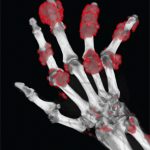 ATLANTA—Based on data from a randomized clinical trial, 42% of patients with uncontrolled gout treated with pegloticase still have a therapeutic response after six months of therapy. Additionally, low to moderate levels of methotrexate or azathioprine attenuate the development of anti-drug antibodies, allowing patients to remain on therapy longer and attain a more complete therapeutic effect.
ATLANTA—Based on data from a randomized clinical trial, 42% of patients with uncontrolled gout treated with pegloticase still have a therapeutic response after six months of therapy. Additionally, low to moderate levels of methotrexate or azathioprine attenuate the development of anti-drug antibodies, allowing patients to remain on therapy longer and attain a more complete therapeutic effect.
This study, presented during the 2019 ACR/ARP Annual Meeting in November, evaluated pegloticasetreated patients with uncontrolled gout in a retrospective chart review from a community rheumatology practice. The goal was to determine if immunomodulator treatment would lower the risk of anti-drug antibodies and provide a more complete treatment response for patients. Patients receiving subcutaneous or oral methotrexate were also included in the review.1
Researchers extracted data on patient responses, which included the duration of pegloticase therapy, gout flares, infusion reactions and methotrexate dosing. Other data included uric acid levels, liver function tests, renal function, hemoglobin and white blood cell counts. Patients’ complete blood count and comprehensive metabolic panel parameters were also closely monitored.
The Results
Ten patients fit the study’s inclusion criteria, nine of whom were men with an average age of 52.3 years and visible tophi.
Methotrexate exposure varied, with 10 patients having received methotrexate and only one patient receiving oral methotrexate. Nine of these patients received methotrexate prior to pegloticase treatment.
At the time of data collection, five patients were complete responders, having received approximately 16 pegloticase doses for about 32 weeks. Three patients were still responding while actively receiving pegloticase, having received 10, five and two doses, respectively. One patient stopped therapy due to a loss of response and a mild infusion reaction, and another patient stopped due to a methotrexate injection-related issue. One patient required prednisone for gout flare.
Liver function test and complete blood count parameters were stable throughout therapy, except in one patient. This patient had a mild, transient alcohol-related liver function test elevation and pancytopenia that improved after treatment and stopping methotrexate use. This patient remained on pegloticase and continued on as a responder.
This small, retrospective study showed that methotrexate, when combined with pegloticase, appears to alleviate the formation of clinically significant anti-drug antibodies. The combination enables more difficult-to-treat gout patients to receive a more complete duration of pegloticase therapy.
Michele B. Kaufman, PharmD, BCGP, is a freelance medical writer based in New York City and a pharmacist at New York Presbyterian Lower Manhattan Hospital.



